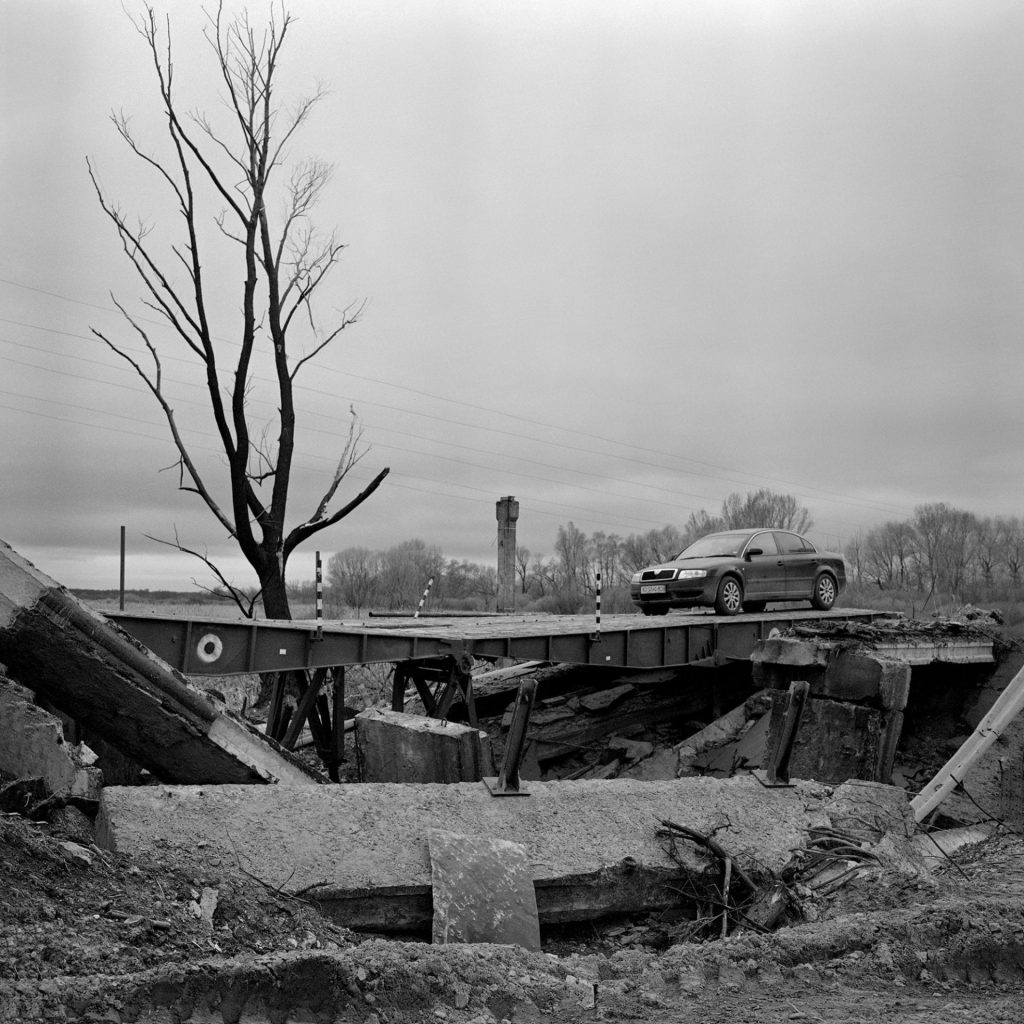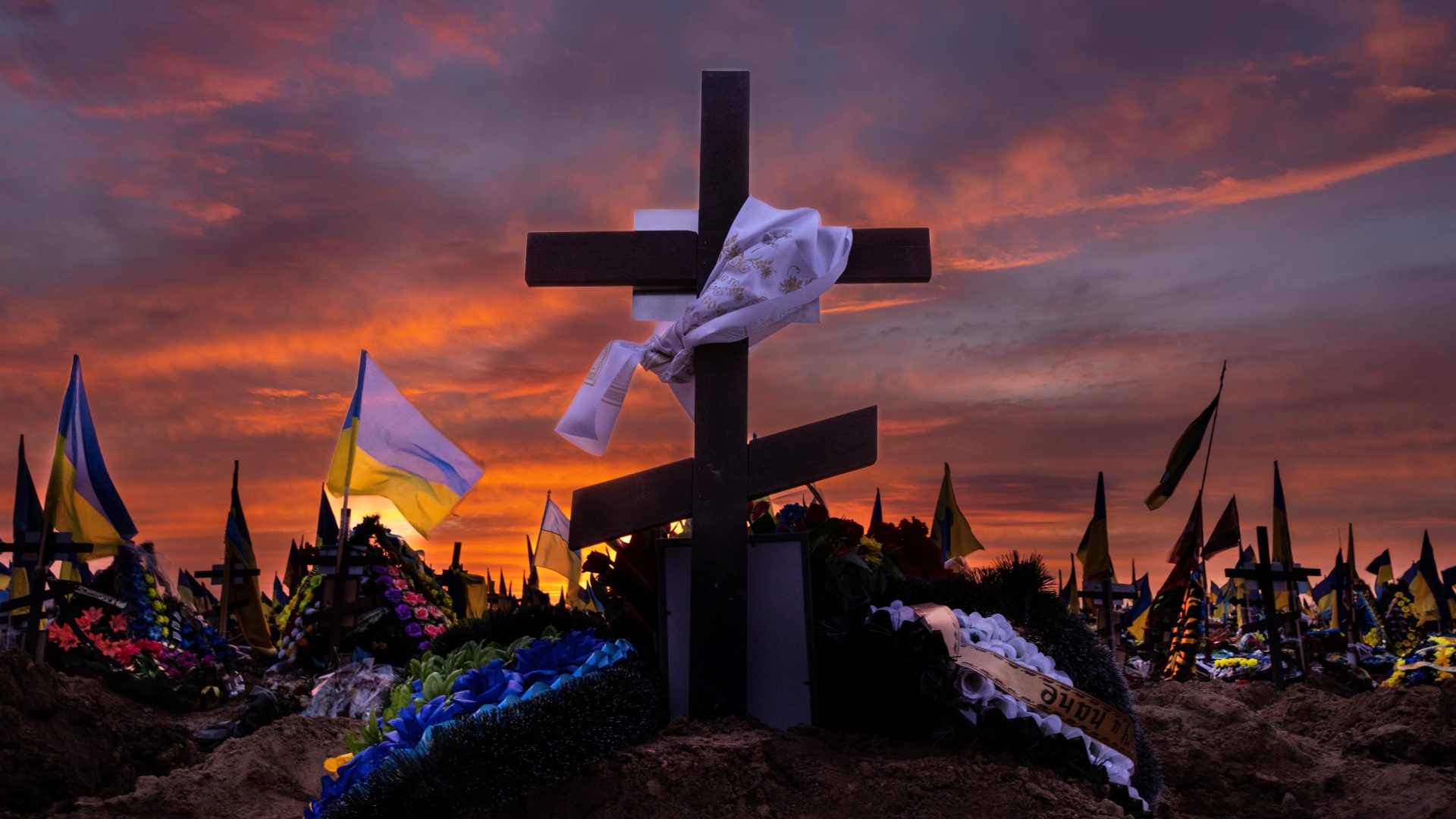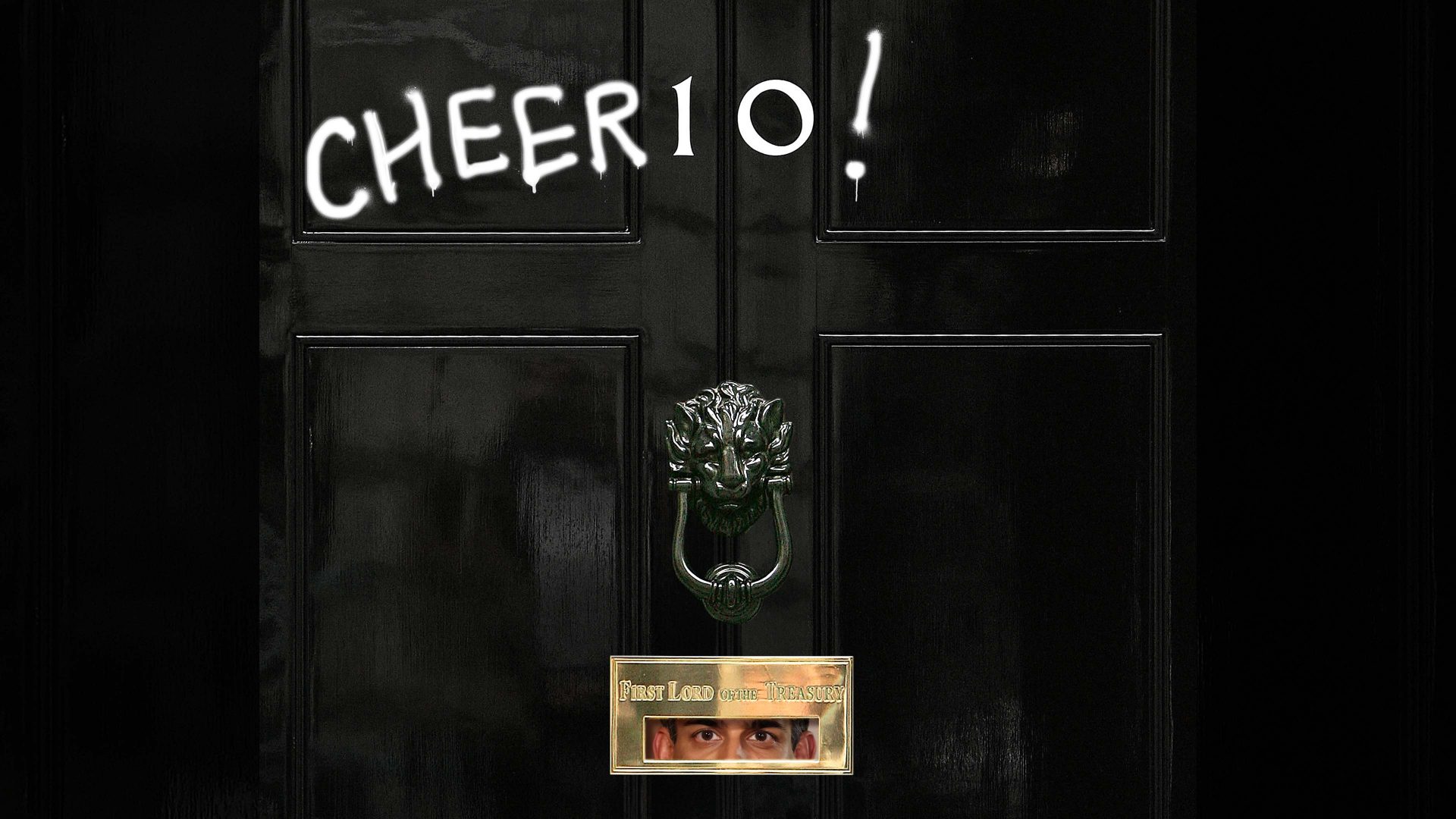His wife’s face is barely recognisable, but he knows it’s her. He identified her from a photo posted on a Russian social network. He had it examined in the faint hope that it might have been retouched. Unfortunately, it wasn’t.
In the photo, Oxana has her eyes closed and can’t seem to open them, as the eyelids covering them are swollen and covered in bloody scabs. Her nose and forehead are also swollen. The top of her head is hidden by a hood and she is sitting apparently with her hands tied. There’s no smile on her face. It’s as if she has lost all signs of life.
Andriy, her husband, is in his 30s but his features are aged – he has gone for more than two months with almost no sleep. He tells his story in the premises of the Center for Civil Liberties, an NGO designated as an “undesirable organisation” by the Russian state. Any contact with the organisation is criminalised. Andriy shows a photo of his wife taken before her abduction. She is ravishing with her fringe, her brown plaits and her big soft eyes, dressed in a military parka.
Oxana was an officer in the Ukrainian armed forces. The last time her husband spoke to her was on February 11, 2024, to tell him that she was leaving on a mission. On February 15, he received a message telling him that she had disappeared the day before. Her colleagues confirmed that they had lost track of her after a bomb explosion. He went to the hospital where the injured and dead had been sent. Oxana’s body was not there. There was only one conclusion: she had been kidnapped by the Russians.
“I looked on Russian social networks and found a photo of my wife with four other people in a place I can’t name here,” says Andriy. I recognised her straight away, despite the haematomas that deformed her.” The photos showed the destroyed and barely recognisable faces of the five soldiers in the brigade. They had all been beaten and tortured.
Since February 15, Andriy has had no information about his wife apart from his own research on the networks and this photo, so painful to look at. It gives you a glimpse of the monstrous and limitless war crimes committed by Russian forces in the course of the war. Holding prisoners without giving details of their situation is contrary to the Geneva Conventions – torture likewise. Andriy learned that several women had been kidnapped and imprisoned in the same place at the same time.
Alongside Andriy are the mother and wife of another soldier. He was kidnapped on November 2, 2023 in the same way as Oxana and her colleagues. The women burst into tears before they could finish speaking. Three other women say they have no news of their husbands – these are civilians. They were kidnapped and imprisoned in March 2022 in Kherson, Irpin and Bucha. One woman, Irina, had learned a few details from exchanged prisoners about conditions inside Rostov prison, where her son is being held.
“The mould-covered cells are filled with 20 to 30 people, who never get out and have to share one bed between three or four. Water drips from the ceiling. The food they are served would be refused by an animal,” she says. According to Ministry of Defence estimates, there are almost 25,000 prisoners in this situation. “Please help us find them,” they all plead, despairing at the powerlessness of the Ukrainian state and the International Red Cross.
The decision by the US House of Representatives on April 20 to vote in favour of $60.8bn in aid for Ukraine has given Ukrainians some cause for optimism, at a time when soldiers and civilians were becoming weary. Troop morale is a decisive factor in what is turning into a war of attrition that neither side is currently in a position to win. The release of American aid is a powerful political signal for the Ukrainians.
For several months, Vladimir Putin has been taking advantage of Ukraine’s shortage of weapons and anti-aircraft defence systems, particularly Patriot missiles, to attack critical infrastructure and civilians. For the past few weeks, Russia has conducted sustained ballistic missile attacks against Ukraine’s power infrastructure. From Kharkiv to Odessa, towns in the south and east of the country are under constant bombardment. On April 11, Russian strikes destroyed Trypilska thermal power station south of Kyiv, which supplied more than 50% of the region’s energy.

Three days before the vote in the US House, Chernihiv, in the north of Ukraine, some 60km from the Russian and Belarussian borders, was targeted. Over a month, more than 1,000 shells fell on the city. On April 17, shortly after 9am, three Iskander ballistic missiles hit a hotel in central Chernihiv, killing more than 20 people and wounding 60 others.
Why three Iskander missiles were fired at a single hotel remains unclear. According to Russian channels, a meeting of high-ranking military personnel was being held in the hotel, including General Dmytro Krasylnykov, commander of the Northern Military Region.
In Chernihiv, local residents and rescue workers deny it. They say this is just another sign of Russia’s strategy to destroy Ukraine and the morale of its people. In Kyiv, a presidential adviser is more elliptical, remarking that “it is not impossible” that military personnel were hit.
A few hours later, firefighters were still searching for bodies under the rubble. The maternity hospital 100 metres away was also hit, but no one was injured.
Not far away in the city centre, the theatre had been partly destroyed by a missile in August, 2023, but just two days later, performances resumed in a full auditorium. “We continue to perform, choosing plays that are not too emotionally charged,” says its director, Sergiy Moysiyenko.
The people of Chernihiv are both gloomy and combative, like all the other resigned Ukrainians who are used to living in the “Land of Blood”, as it was called by the historian Timothy Snyder. “We will continue to fight until the last Russian soldier is dead,” said Oleksandr Ivchenko, a young firefighter at the scene of the strike, his eyes red and on the verge of tears.
President Volodymyr Zelensky expressed his anger on his Telegram channel after the strike on Chernihiv. “This would not have happened if Ukraine had received sufficient air defence equipment and if the world’s determination to counter Russian terror had been sufficient,” he wrote.
Ihor Zhovkva, deputy head of the presidential cabinet, did not mince his words in expressing his own anger at seeing the Americans, British and French less eager to defend the skies over Ukraine than those over Israel against Iranian drones and missiles.
While the Ukrainians are grateful to their western allies for their undeniable help, you can feel their bitterness. Their allies, first and foremost the Americans, have been reluctant since the start of the war to supply the necessary weapons in time.
What other than “reluctance” can explain the fact that once the Ukrainians had reconquered around 80km of the Donbas region, in autumn 2022, their breakthroughs were not followed through? “Ukrainian politicians and soldiers told me: ‘We were held back’,” confides an intelligence officer for an international agency.
The western message was: Don’t go too far – don’t provoke an immoderate reaction from the Russians.
Ukrainians oscillate between weariness and resilience. Some soldiers have gone without leave for a year. The reserves of shells and anti-aircraft defence systems have run dry, and the F-16 fighter planes promised a year ago have not arrived.
Those who suffer daily horror and death at the front are finding it increasingly difficult to cope with people living their life normally away from the front line, in Kyiv in particular, seemingly cut off from the war. “For a large proportion of Ukrainians, the war in Donbas is as distant as the war in Somalia,” says a Ukrainian government official responsible for security and defence.
Indifference is also a sign of resilience. A member of parliament from the ruling party, Oleksandr Merezhko, compares Ukrainian morale to that of the boxer Mike Tyson: “Yes, I’m tired. Yet if I stop fighting, it won’t improve my situation. So I keep on fighting.”
According to the latest poll quoted by Merezhko, 77% of Ukrainians say they are not tired of the war. In Lviv, there is a hospital unit specialising in psychological rehabilitation and bionic prostheses for military and civilian amputees. One of the soldiers who was treated there returned to the front lines with his prosthesis, and sent his doctors a drawing with the word: “Unbroken”. That has since become the hospital unit’s name.
The Ukrainians are fighting at least four wars at the same time. Alongside the military warfare on the ground, the psychological warfare in people’s minds, and the judicial warfare of scientifically documenting Russian war crimes, there is diplomatic warfare.
How can the war be ended? Since the Ukrainian counter-offensive in the summer of 2023 failed, the Russians have clearly regained the upper hand. But there is good news: Ukrainian successes in the Black Sea; the release by the US of $60.8bn in aid; the arrival in June of the F-16 fighter jets promised a year ago; the dispatch by Germany of air defence missiles, including two Patriot anti-missile batteries; a million shells produced in Europe or bought by Europeans from third countries; new ATACMS missiles delivered by the Pentagon and capable of striking heavily at the rear of the Russian army.
The American aid plan also authorises Joe Biden to confiscate and sell Russian assets so that they can be used to finance the reconstruction of Ukraine.
Two deadlines are forcing the American and European allies to act quickly. In November, a victory for Donald Trump in the US elections would mean victory for Vladimir Putin in Ukraine. In June, a peace conference will be held in Switzerland, following on from the G7 in Italy. At Zelensky’s initiative, the G7 countries will attend, alongside China and the countries of the “global south” – but not Russia.
Officially, the objective is to take stock of the war’s effect on the world economy. Unofficially, it is to convince the Chinese and the countries of the south to put pressure on Putin.
By June, Ukraine should be in a much stronger military position than it is now. But Ukraine needs both battlefield and diplomatic advantage over Putin if it is to win this war.
Some first names have been altered




